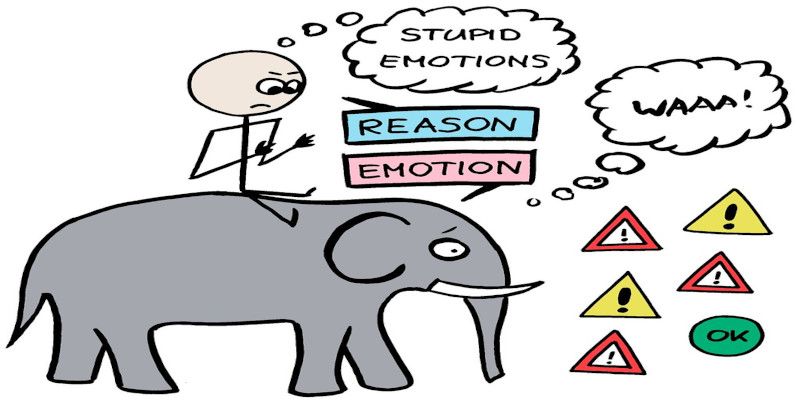Table of Contents
ToggleMany people have experienced a huge downfall because they were arrogant, and thought too highly of themselves. Nobody is invincible, and everyone can go down.
That’s why pride comes before the fall. We must learn to forestall becoming prideful to become, and remain, thriving.
Why does pride come before the fall?
Makes us overconfident
Being overly prideful can make us overconfident since we’re feeling better than we truly are, and thinking with our feelings rather than with our rational mind.
Overconfidence is a slow and insidious killer. Sooner or later, we’re bound to make a mistake which can have terrible results.
Makes us arrogant
Arrogant people have a hard time learning new things since they think they already know everything there is to learn, and are much more prone to making mistakes. They’re often unable to analyze what, and where it went wrong.
Being self-assured is good, but taking it too far and becoming arrogant in the process is something we should avoid at all costs since nothing good can come forth from it.
There’s a fine line between confidence and arrogance. But as long as you’re capable of backing up what you’re saying, you’re good to go in my book.
Creates a fixed mindset

A fixed mindset is stagnant, and standing still is the same as going backward. You’re unable to process and transform new information into knowledge since you already think you know everything there’s to that subject.
This will lead to issues before long since nobody can know it all, and we need a continuous growth mindset in order not to get behind. That’s because others are constantly getting better. And we don’t want to be left in the dust, that’s for sure.
Unable to learn new things
You’re going to get left behind when you’re unable to acquire novel expertise because you’re too prideful. Knowledge is power, and when you can’t internalize that large well of new information, you’re going to get in trouble.
Part of the beauty in life is walking the path of self-improvement, and continuously learning new skills. What a boring life it would be if we couldn’t acquire new knowledge, and gain a different perspective in the process.
Unable to learn from our mistakes

Seeing people get stuck in life, unable to ever change their ways or fix their mistakes is a sad sight to behold. For some, it’s because they cannot be introspective and analytic, while others are simply too proud to even attempt learning new stuff.
Fortunately, we can all learn how to get rid of arrogance.
Making our own choices means that we’re going to make mistakes and that we’re going to fail by default. But dusting ourselves off and learning from those errors is what permits us to thrive in the future instead of repeating the same mistakes.
Unable to pinpoint where things went wrong
Before we can fix something, we must first realize that it’s broken, and analyze where the issue first arose.
That way, we can see what mistakes we’ve made that led to the following issues. That’s vital to not make the same mistake twice and to improve our future lives.
Can create stress and tension

Being too prideful can make us experience pressure from feeling the need to perform constantly, prove ourselves, and compare ourselves to other people.
The only person we should be comparing ourselves to is ourselves. We should strive to be a bit better than the person we were yesterday in some way, shape, or form.
Can make us lose sight of the bigger picture
Being preoccupied with your performance, how you’re comparing to others, and how your peers perceive you can take valuable time and attention away from the big picture.
It’s the essence that’s most important, and the details are there to help paint a clearer picture of the subject at hand. Getting caught up in the details isn’t beneficial, since it can delude the message at its core.
Disconnects us from reality

We should remain firmly with our two feet on the ground if we want to achieve our goals. No matter how much we want to, and how attractive living in a fairy tale might seem, reality doesn’t bend to our will. It simply is what it is.
Being confident to a fault means we don’t have an accurate view of the world. This will lead to making the wrong choices that can lead to our downfall.
Pride makes us compare ourselves to others
Comparing ourselves to others will lead to jealousy, envy, and sometimes even hate and spite. That’s because every person has their strengths and weaknesses. What we most often see is other people’s strengths, and how much better they are than us at some given things.
But everyone has their advantages and deficits due to what Mother Nature gave them. We must learn to find, and appreciate, our gifts instead of constantly nagging about our lesser talents.
Devaluing others leads to issues

Instead of cheering on others to become better, devaluing our peers will make them angry, vengeful, and most likely also sad while possibly destroying their confidence.
Never degrade others to make yourself look, or feel, better. That just shows insecurity, a lack of ethics, and that you’re an overall bad, weak-minded person. You should spread love instead of hate and try to improve the lives of others instead of tearing them down.
Unable to pinpoint our weaknesses
You need to know what your positives and weaknesses are to address your imperfections, while at the same time playing to your strengths for the best results.
Prideful people are typically unable to pinpoint their weaknesses since they’re too busy wallowing in their sense of superiority. Simultaneously, their minds are closed off to the fact that they might not be perfect, and that just like everyone else, they have their negatives too.
Frequently Asked Questions (FAQ)
What does pride come before the fall mean?

That’s because being too prideful leads to a fixed mindset that closes off our psyche. This prevents us from learning from new experiences and our own mistakes.
This inevitably leads to making bad decisions based on our sense of superiority rather than looking at the facts and empirical evidence by employing common sense that’s rooted in reality.
Who said pride comes before the fall?


Having too much pride can be caused by two main reasons.
It can originate from low self-esteem and shame, or an inflated sense of superiority.
We typically try to overcompensate for our poor self-worth and insecurity by attempting to seem and feel superior to others to feel better about ourselves and the situation. It’s also a way to hide our insecurities by putting on a mask of false bravado.
We rather criticize other people instead of having to admit our failures and shortcomings. And pride allows us to do just that.
What are the signs of a prideful person?

- Disregard other people
- Self-centered
- Don’t ask many questions since they’re primarily interested in themselves rather than others
- Possess a sense of superiority over others
- Dominate conversations talking highly about themselves to impress others
- Want to be served instead of serving themselves
- Don’t, or very rarely compliment others
- Try to impress others with just how smart they are
- An endless desire to be right
- Continue arguing, even if they’re wrong
- Quick to criticize others even though they don’t do the same for themselves
- Not generous to those around them
- Abandon their loved ones and friends in their selfish pursuit of self-fulfilling desires
- Neglect others
What are the two types of pride?

The two types of pride are authentic pride and hubristic pride.
Authentic pride comes from the fact that someone is competent, and has consequently achieved a lot. That’s where their sense of pride comes from.
Authentic pride is less bad since it’s grounded in reality and objectivity rather than subjectivity and insecurity.
Hubristic pride comes from arrogance and from being egotistical. It’s a way to conceal our weaknesses, such as a low amount of self-esteem and insecurity.
Three types of pride
- Dignity
- Superiority
- Arrogance
These types are analyzed by different sequences of head posture, smile, eyelid position, and eyebrow.
Is pride a feeling or emotion?

Pride goes before a fall examples

An example of pride that goes before a fall could be that the owner of a successful business refuses to acquire new skills or continue working hard since they’re already thriving. They think that they’ve reached the pinnacle and that nothing can bring them down.
Needless to say, that’s the wrong mentality to have, and the competition will unavoidably catch up, and even surpass them because they’re working hard, all the while continuously learning new abilities.
That’s why the business owner isn’t going to remain flourishing in the future.
Pride comes before the fall synonyms
Pride comes before the fall has many synonyms such as:
- Pride comes before a fall
- Pride cometh before a fall
- Pride cometh before the fall
- Pride goes before a fall
- Pride goes before the fall
- Pride goeth before fall
- Pride goeth before the fall
- Pride comes before fall
- Pride often comes before the fall
While the wording is slightly different, the meaning remains by and large the same. That’s why these phrasings are typically used interchangeably.
Final note

We can conclude that pride goes before the fall. Being confident is good, but being arrogant is not, and will cause our downfall eventually.
Make it a point to remain humble, and firmly rooted in reality to prevent yourself from becoming too prideful.


1 thought on “Why pride comes before the fall”
Comments are closed.